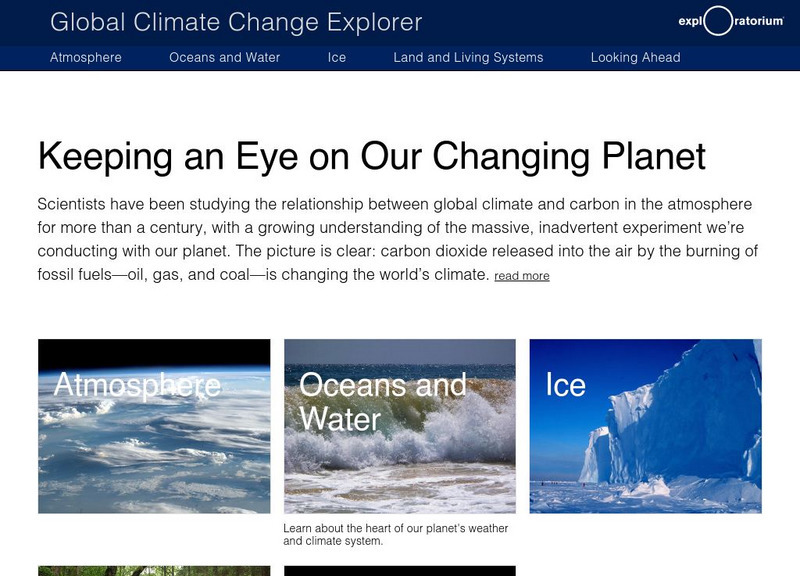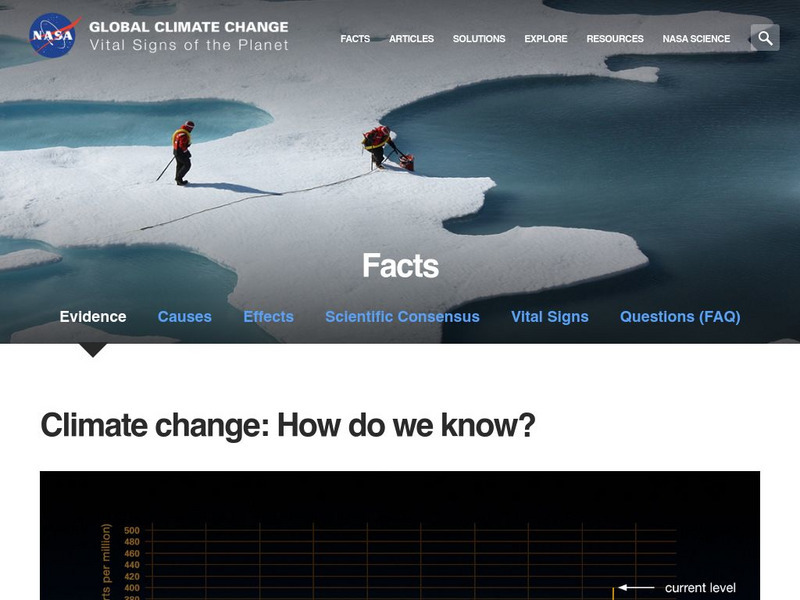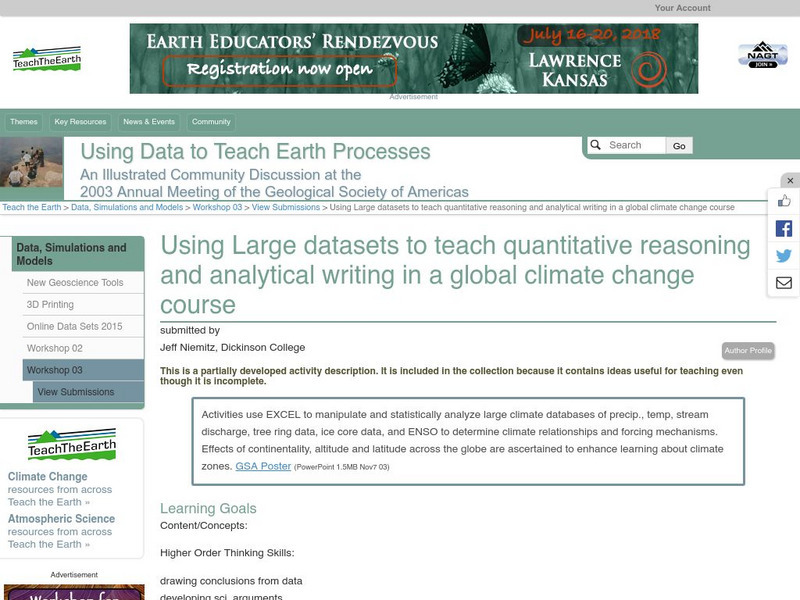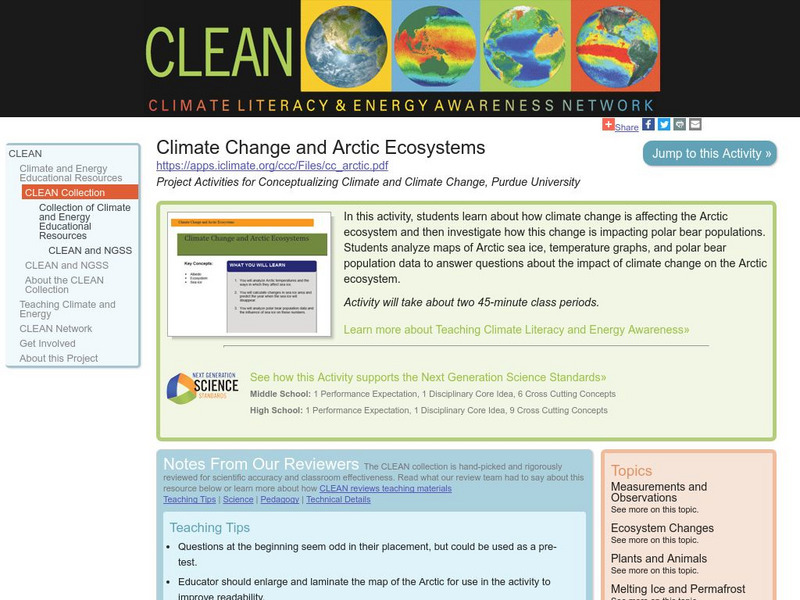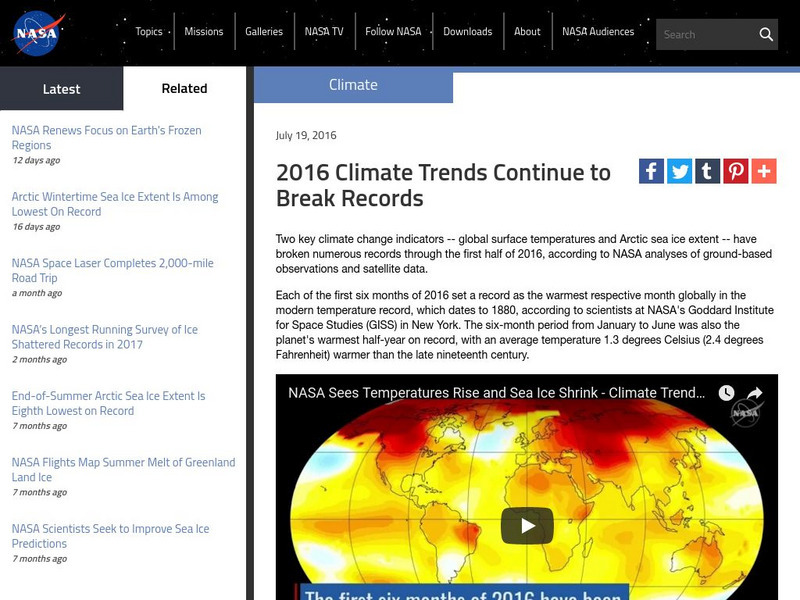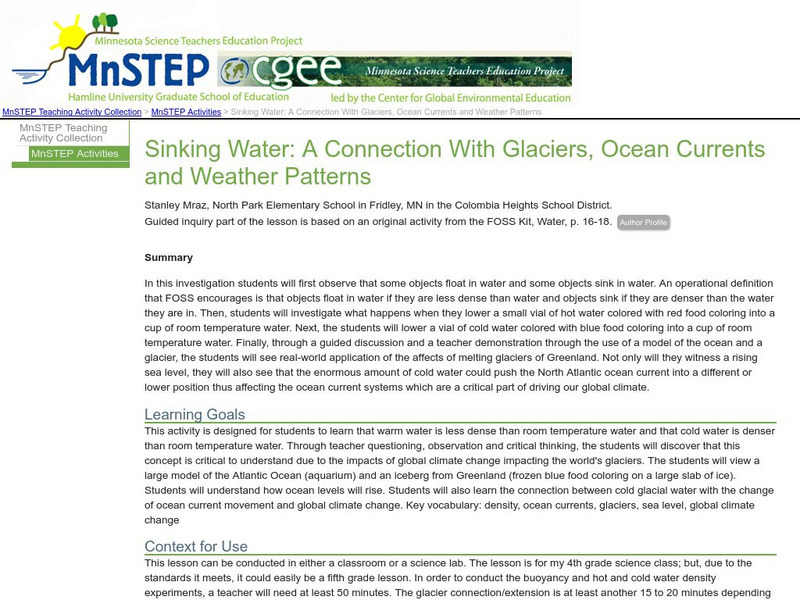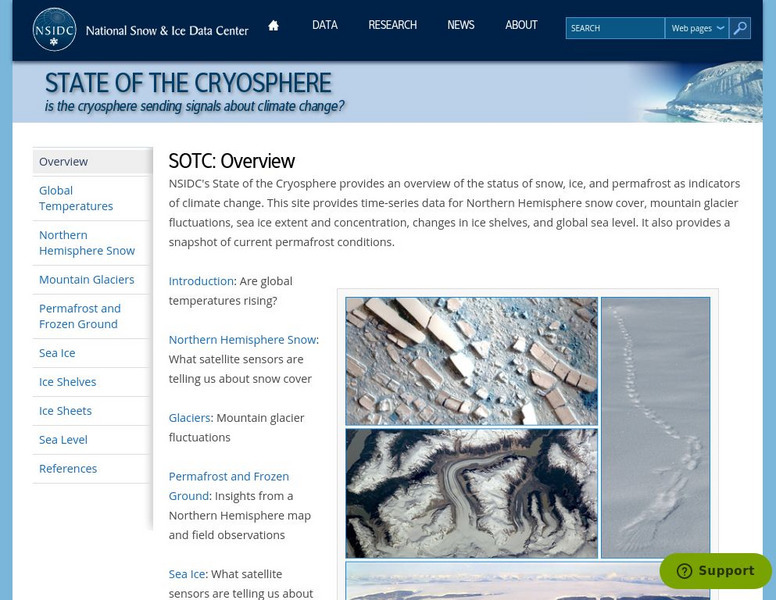Exploratorium
Exploratorium: Global Climate Change: Research Explorer
Explore scientific data relating to the atmosphere, oceans, areas covered by ice, and living organisms in all these domains. Interpret past and present climate data to predict future climate change and its possible effects.
NASA
Nasa: Climate Change: How Do We Know?
Provides extensive evidence of the many ways scientists have observed and recorded climate change on a rapid, global scale. Lists different events observed, such as receding ice sheets and evidence in rocks, and presents graphs, images,...
University Corporation for Atmospheric Research
Ucar: Little Ice Age: Dark Skies: Volcanic Contribution to Climate Change
In this activity, students learn how volcanic eruptions affect global climate.
Science Education Resource Center at Carleton College
Serc: Quantitative Reasoning and Analytical Writing in a Global Climate Change
In this lesson learners use Microsoft Excel to manipulate and statistically analyze large climate databases of precipitation., temperature, stream discharge, tree ring data, ice core data, and ENSO to determine climate relationships and...
PBS
Pbs Learning Media: Greenland Ice Sheet Project 2: A Record of Climate Change
Using images and graphs, this interactive resource illustrates scientists' efforts to study Earth's climatic history for the last 250,000 years by drilling into the Greenland Ice Sheet and examining ice cores. Includes background reading...
Exploratorium
Exploratorium: Global Climate Change: Cryosphere
Examine the effects climate has on the snow and ice covered cryosphere and see live data gathered from the North and South Poles.
University Corporation for Atmospheric Research
Ucar: Why Does Climate Change?
Factors that have the power to change global climate can be natural, like volcanic eruptions and changes in solar energy, or caused by humans, like the addition of greenhouse gases to the atmosphere.
Center for Educational Technologies
Cet: Exploring the Environment: Ice Caps and Sea Levels
Students have just completed climate science fieldwork studying Earth's ice caps and sea levels. Analyze the data to present a report to the U.S. Panel on Global Climate Change.
Climate Literacy
Clean: Climate Change and Arctic Ecosystems
Learners learn about how climate change is affecting the Arctic ecosystem, and then investigate how this change is impacting polar bear populations. Students analyze maps of Arctic sea ice, temperature graphs, and polar bear population...
BBC
Bbc: News: Guide to Climate Change
The BBC offers an interactive guide to climate change, including a sliding scale depicting climate change from 1885 to 2099, animation which explores how the greenhouse effect works, and detailed diagrams exploring the carbon cycle, the...
NASA
Nasa: 2016 Climate Trends Continue to Break Records
NASA studies of global surface temperatures and Arctic sea ice extent provide data to determine climate changes on Earth. Research for only the first half of 2016 identifies the year as being one of the hottest on record.
University Corporation for Atmospheric Research
Ucar: The Water Cycle and Climate Change
Water moves from place to place through the water cycle, which is changing as climate changes. Learn how the water cycle is changing as global temperatures rise.
University of Wisconsin
Uw: Probabilities, Uncertainties and Units Used to Quantify Climate Change
This resource engages learners in using scientific data to analyze a 150-year dataset from Lake Mendota in Madison Wisconsin reflecting seasonal ice cover.
PBS
Pbs: Scientific American Frontiers: Little Ice Age
Did you know there was a global 'Little Ice Age' around the time Columbus sailed across the Atlantic? Climatologists have documented changes in temperature and how countries and people around the world were affected. What caused the LIA?...
Other
Geoscience Research Institute: The Little Ice Age
This very detailed article examines the long-term climate changes throughout the world. Discusses agriculture and provides graphs and illustrations. Includes lots of scientific discussion.
Other
Digital Library for Earth System Education: Changing Sea Level
A suite of lessons lead inquiry-based exploration of melting sea ice and evidence that it is affecting sea level, namely glacial evidence, geologic evidence, fossil evidence, and isotopic evidence.
Climate Literacy
Clean: How Does Melting Ice Affect Sea Level?
Students investigate how sea levels might rise when ice sheets and ice caps melt by constructing a pair of models and seeing the effects of ice melt in two different situations.
National Earth Science Teachers Association
Windows to the Universe: Effects of Climate Change Today
Learn some effects of climate change that are being caused by warmer temperatures. Links to related material.
Science Education Resource Center at Carleton College
Serc: Mn Step: Sinking Water: Glaciers, Ocean Currents and Weather Patterns
A lesson where students learn how warm water is less dense than cold water, and what this means for global climate change as ice from the polar regions melts. Students will do experiments in buoyancy and water density when hot or cold,...
National Snow and Ice Data Center
National Snow and Ice Data Center: State of the Cryosphere
This site provides thorough information about the status of snow and ice as indicators of climate change. This site has links to introductory information about the cryosphere, as well as info on specific area weather patterns.
NASA
Nasa: Climate Time Machine
Travel through time and explore how the changing climate has affected sea ice, sea level, carbon dioxide levels, and global temperatures. Also, decide whether or not you would be affected if the sea level rose due to warmer temperatures...
Centers for Disease Control and Prevention
Centers for Disease Control: Shakespeare to Defoe: Malaria in England
Detailed analysis of the spread of malaria in England owing to changes in climate during the sixteenth and seventeenth centuries.
Woods Hole Oceanographic Institution
Polar Discovery: The Greenland Glacier Expedition: July 7 July 24, 2008
This polar expedition took place in 2008, but you can still experience the thrill of following these scientists as they engage in research studying the changes in Greenland's ice sheet. Meet the research team and learn about the...
PBS
Pbs Learning Media: Link Between Arctic Sea Ice and Solar Radiation Absorbed
The Arctic plays an important role in regulating Earth's climate. The region reflects much of the Sun's energy and helps keep the planet cool. Data collected by NASA have revealed that sea ice in the Arctic has steadily declined over the...
